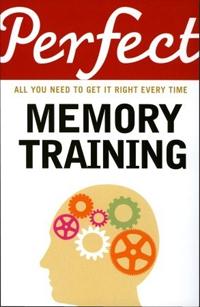Perfect Memory Training is essential reading for anyone who wants to strengthen their powers of recall. Written by Dr Fiona McPherson, a psychologist with years of experience in the field, it explains how memories are created and stored, sets out a range of techniques to help you improve these processes, and provides exercises to help you track your progress. Whether you want to get better at remembering names, faces, lists or pieces of general knowledge, Perfect Memory Training has everything you need to boost your mental ability.
The Perfect series is a range of practical guides that give clear and straightforward advice on everything from getting your first job to choosing your baby's name. Written by experienced authors offering tried-and-tested tips, each book contains all you need to get it right first time.
Perfect Memory Training is a revised edition of The Memory Key.
Chapter 1: How to permanently improve your memory
Most memory-improvement programs do not result in long-lasting change
Memory is plural!
Memory skills can cost too much
What you need to know to improve your memory skills
Knowing what can be done
Becoming confident in your memory skills
Chapter 2: What comes out is what went in
The building blocks of memory
How memory works
Information is infinite and we cannot store it all
Is your memory a junk-heap or a storage system?
Association is the foundation stone of thought
Memory is held in a pattern not in a place
The implications of memory being a network
The key to remembering is making codes that are easily found
What comes out must have gone in
Chapter 3: Finding is tricky when you don’t know where to look
To find a code you follow a trail
A good trail needs a good starting point
Retrieval cues trigger memory search
Your ability to generate recall cues may be critical to your successful remembering
Selecting the right trail
Knowing you're going in the right direction
Principles of Retrieving
Successful retrieval requires effective encoding
Chapter 4: CONNECTION = UNDERSTANDING
Making memory codes accessible
The principles of accessibility
Making links stronger
Connecting and clustering: giving meaning to information
Effective principles of clustering
Chapter 5: Selecting the right information
Selection governs connection
Similarity joins and distinctiveness separates
Principles of Encoding
Rote-learning of unrelated material
Memorizing versus learning
Principles of effective selection
Choosing good recall cues for meaningless information
Attention matters
Chapter 6: Working with memory codes
Working memory holds the information you're working on
How working memory and the database interact
How we use working memory
Differences between working memory and database codes
Holding information in working memory
Individual differences in working memory capacity
Chapter 7: Review
Memory situations
The principles
Chapter 8: Identifying different memory domains
Different types of information need to be dealt with in different ways
Specific memory domains
Knowledge memory vs personal memory
Personal memory contains several different memory domains
Chapter 9: General information skills
A classification of memory strategies
Manipulating information for understanding and recall
Taking notes
Active reading
Elaboration strategies
Applying the right study strategy
Your personal learning style
The deep versus the surface approach to learning
Transcending your personal style
Chapter 10: An analysis of memory ‘tricks’
Mnemonic strategies: what are they and do they work
Mnemonic strategies are a special type of memory strategy
Imagery mnemonics
Verbal mnemonics
Mnemonic strategies: What are they good for?
Chapter 11: General support strategies
Information manipulation strategies are task specific
General support strategies support attention
Paying attention
Planning skills
Monitoring skills
Strategies to improve the quality of attention
Manipulating your environment
Manipulating your self
Chapter 12: Becoming a successful strategy user
Your master strategy
Matching memory tasks with appropriate strategies
Being a strategic thinker
Appraising the memory situation
Thinking through a situation
Taking your personal style into account
Chapter 13: Putting it into practice
The cost of memory strategies
How to achieve permanent memory improvement
Glossary of terms
References
Index
Formats: Paperback, E-book (pdf), E-book (Kindle), E-book (ePub)
190 pages
Publisher: Random House UK (July, 2010)
ISBN:
9781409061069 (ePub)
9781847945365 (paperback)
ASIN: B003V4AT1W (Kindle)




